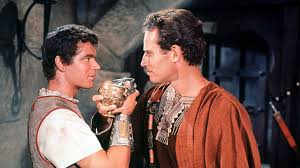Ben-Hur (1959)

Ben-Hur (1959) 

Directed by William Wyler, Ben-Hur is an epic historical drama that forever reshaped the landscape of cinema. Adapted from Lew Wallace’s novel, the film tells the story of Judah Ben-Hur (Charlton Heston), a Jewish prince in ancient Jerusalem whose life is shattered when his childhood friend Messala (Stephen Boyd), now a Roman officer, betrays him. Stripped of his title, enslaved, and cast into a brutal world of gladiators and chariots, Judah embarks on a journey of vengeance, redemption, and spiritual awakening.

Set against the grandeur of the Roman Empire, Ben-Hur explores themes of revenge, faith, and the transformative power of forgiveness. The story reaches its unforgettable climax in the legendary chariot race, a sequence that remains one of the most thrilling and visually stunning moments in film history.

Visually, Ben-Hur is a marvel. The film’s groundbreaking special effects, lavish production design, and immense scale bring the ancient world vividly to life. Wyler’s direction strikes a perfect balance, capturing both the sweeping epic nature of the story and the intimate emotional moments of Judah’s personal journey. Charlton Heston’s powerful performance grounds the film, while a stellar supporting cast, including Stephen Boyd and others, adds rich layers to the narrative.

Miklos Rozsa’s sweeping score intensifies the grandeur of the film, underscoring its emotional and thematic depth. With 11 Academy Awards, including Best Picture, Ben-Hur is not only celebrated for its technical achievements but also for its poignant exploration of forgiveness and the resilience of the human spirit. It remains a monumental classic that continues to resonate with audiences and stands as a towering achievement in cinematic history.












